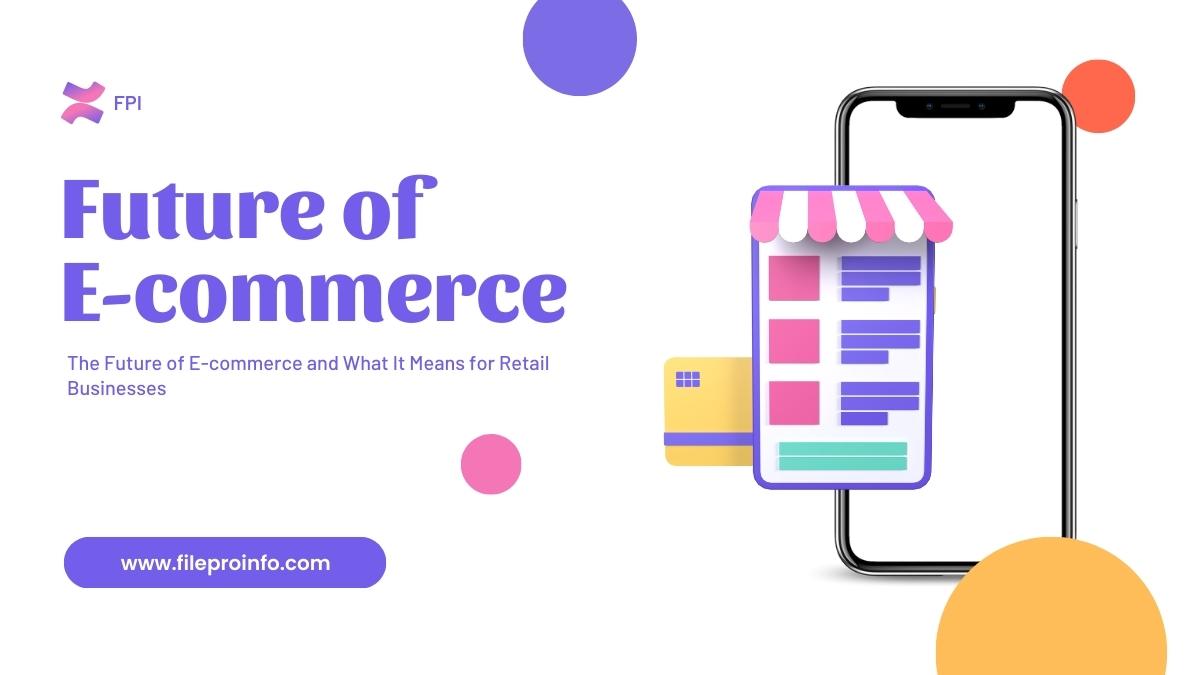
The world of e-commerce has been rapidly evolving over the last decade, and it shows no sign of slowing down. As technology continues to advance and consumer behavior shifts, retailers must adapt in order to stay competitive. In this blog post, we’ll explore the future of e-commerce and what it means for retail businesses.
1. Mobile commerce will continue to grow
The future of e-commerce is looking increasingly mobile. Mobile commerce, or m-commerce, is growing rapidly with the majority of consumers now owning a smartphone or other mobile device. Businesses have been taking notice of this shift in consumer behavior and are changing their strategies to capitalize on the opportunities presented by m-commerce.
Retail businesses in particular have seen great success with the adoption of m-commerce technologies. By creating an optimized online shopping experience for customers on mobile devices, retailers can take advantage of the convenience and accessibility offered by m-commerce to increase engagement and sales. Moreover, by leveraging data from customers’ browsing and buying habits, retailers can deliver a more personalized experience tailored to individual customer needs.
Given these advantages, it’s clear that mobile commerce will continue to play a major role in the future of e-commerce.
2. Personalization will become even more important
The future of e-commerce is quickly shifting to a more personalized experience for customers. Retail businesses need to take note and adjust their strategies accordingly if they want to provide successful customer experiences in the upcoming years. One of the most important aspects for retail success, as well as customer satisfaction, is personalization.
Personalization can be defined as providing tailored services and products according to individual consumer needs. This allows businesses to create stronger relationships with their customers and encourage loyalty. In addition, personalization helps retailers understand what their target market wants and build trust through targeted offers and promotions. Furthermore, it can also help them increase sales by offering personalized product recommendations based on past buying behaviors or preferences that have been collected from customers’ online activities.
3. Social media will play a bigger role in e-commerce
The future of e-commerce is changing rapidly, and the role of social media will play a larger part in this evolution. Retail businesses now recognize that social media is a powerful tool they can use to increase sales, engage with customers, and build loyal relationships. As more shoppers turn to online methods for buying goods, retailers are looking to social media as a way to stand out from the competition and create an interactive shopping experience for their consumers.
Social media offers many advantages for retail businesses; it allows them to reach new audiences quickly and cost-effectively, interact directly with customers in real time, gain insights into consumer behavior trends and preferences, target potential customers based on interests or demographics, and track performance of campaigns over time. Additionally, through content marketing tactics such as sponsored posts or influencer collaborations they can generate more brand awareness leading to sales growth.
4. Augmented reality (AR) and virtual reality (VR) will enhance the shopping experience
The future of e-commerce and retail businesses lies in the hands of augmented reality (AR) and virtual reality (VR). Through utilizing these two technologies, shoppers can now have access to an immersive shopping experience that goes beyond what they could get from a traditional online store. With AR and VR, customers have the chance to view products from all angles, examine product details before purchasing, receive personalized recommendations based on their interests, and even visualize how products would look in their homes.
By leveraging AR and VR technologies, retailers can offer an enhanced shopping experience for customers that was not previously available. For example, customers can virtually try on clothes or see a home interior with furniture pieces displayed realistically. Additionally, retailers are able to capture customer data such as information about their preferences and interests which allows them to customize product offerings accordingly.
5. Same-day delivery and other fulfillment options will become the norm
The future of e-commerce is here, and retail businesses must keep up with the demands of ever-evolving consumer expectations. Same-day delivery has become the new norm for online shoppers, as they expect fast and convenient fulfillment options that make their shopping experience easier. Companies are now providing same-day delivery services to meet this customer demand and stay competitive in the e-commerce landscape.
Same-day delivery is becoming increasingly popular among consumers, with a recent survey showing that over 45 percent of customers prefer same-day delivery when offered an option. To accommodate this preference, many companies have implemented same-day shipping services that allow customers to receive their items on the same day they place their orders. This service provides an advantage for companies as it gives them a competitive edge over other retailers who don’t offer such a speedy option.
Conclusion
The future of e-commerce is full of opportunities for retailers who are willing to adapt and innovate. By embracing mobile commerce, personalization, social media, AR and VR, and fast and convenient fulfillment options, retailers can provide a seamless and engaging shopping experience for their customers. Those who do not adapt risk falling behind their competitors and losing market share in an increasingly competitive e-commerce landscape.




